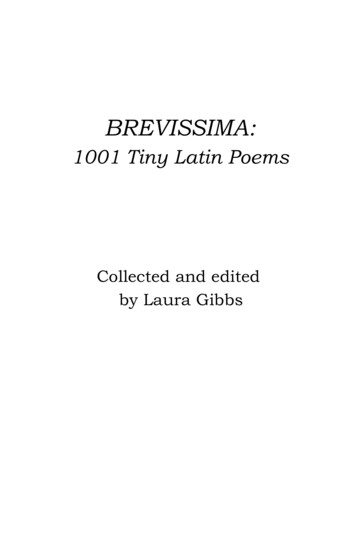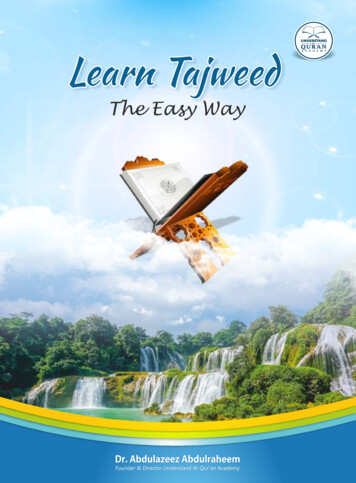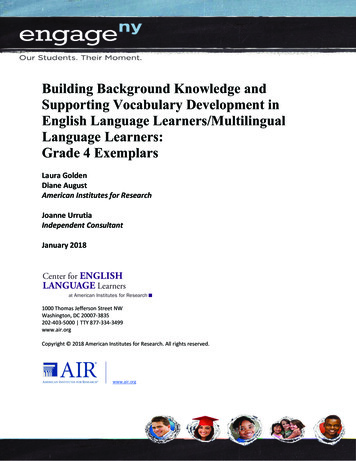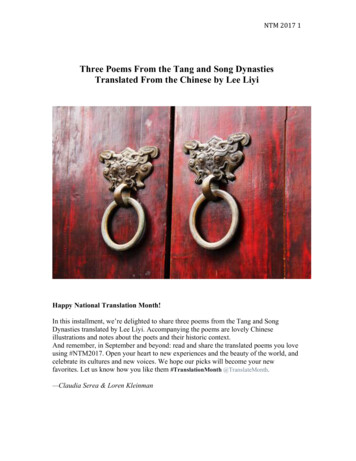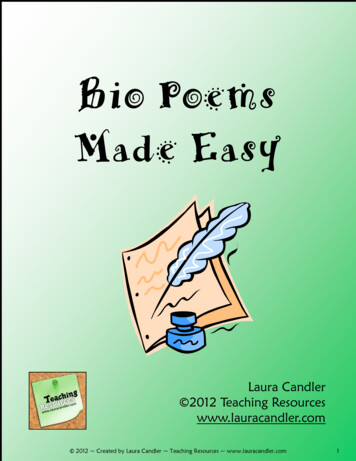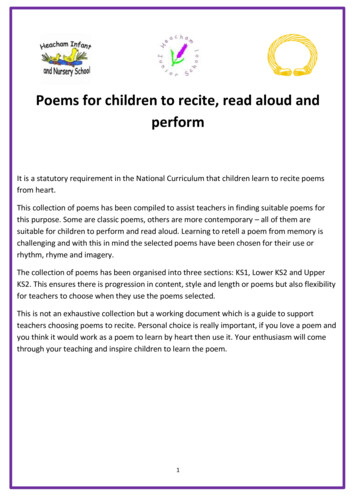
Transcription
Poems for children to recite, read aloud andperformIt is a statutory requirement in the National Curriculum that children learn to recite poemsfrom heart.This collection of poems has been compiled to assist teachers in finding suitable poems forthis purpose. Some are classic poems, others are more contemporary – all of them aresuitable for children to perform and read aloud. Learning to retell a poem from memory ischallenging and with this in mind the selected poems have been chosen for their use orrhythm, rhyme and imagery.The collection of poems has been organised into three sections: KS1, Lower KS2 and UpperKS2. This ensures there is progression in content, style and length or poems but also flexibilityfor teachers to choose when they use the poems selected.This is not an exhaustive collection but a working document which is a guide to supportteachers choosing poems to recite. Personal choice is really important, if you love a poem andyou think it would work as a poem to learn by heart then use it. Your enthusiasm will comethrough your teaching and inspire children to learn the poem.1
2
Key Stage One3
4
5
EletelephonyOnce there was an elepahnt.Who tried to use the telephant.No! No! I mean elephoneWho tried to use the telephone.(Dear me! I am not quite certain quiteThat even now I’ve got it right.)Howe-er it was, he got his trunkEntangled in the telephunk.The more he tried to get it free,The louder buzzed the telephee.(I fear I’d better drop the songOf elehop and telephong!)Laura RIchards6
7
If You Were A CarrotIf you were a carrotand I was a sproutI’d boil along with youI’d sit on your plateIf you were a tadpoleand I was a frogI’d wait till your legs grewI’d teach you to croakIf you were a conkerand I was a stringwe’d win every battlewe’d beat everythingIf you were a jotterand I was a penI’d write you a messageagain and againIf you were a farmerI’d be in your herdif you were a popsongI’d sing every wordI wish I could tell youthat I like you a lotbut you’re like a secretand I’m like a knot.Berlie Doherty8
Please Do Not Feed The AnimalsPlease do not feed the ostrichessandwichesor the polar bearséclairs.Do not offer the wombatskumquatsor the rattle-snakesfruit-cakes.Remember that piranhasare not allowed bananasor partridgessausages.Never approach a storkwith things on a forkor the bustardwith a plate of custardNo leopardlikes anything pepperedand meerkatsdislike Kit Kats.Remember that grapesupset apesand meringuesdo the same for orang-utans.Most importantly–do not feed the cheetahyour teacher.Robert Hull9
Lower Key Stage Two (Year 3/4)Child’s Song In SpringThe silver birch is a dainty lady,She wears a satin gown;The elm tree makes the old churchyard shady,She will not live in town.The English oak is a sturdy fellow,He gets his green coat late;The willow is smart in a suit of yellow,While brown the beech trees wait.Such a gay green gown God gives the larches –As green as He is good!The hazels hold up their arms for arches,When Spring rides through the wood.The chestnut’s proud and the lilac’s pretty,The poplar’s gentle and tall,But the plane tree’s kind to the poor dull city –I love him best of all!E. Nesbit10
11
Brian Moses12
13
14
Double TroubleWe were rich and poor.We were bought and sold.We were black and white.We were young and old.We were life and death.We were north and south.We were hand in hand.We were foot and mouth.We were good and bad.We were war and peace.We were day and night.We were man and beast.We were hunger and greed.We were water and land.We were empty and full.We were lost and found.We had two strings to our bow.We were in it together.We were the spitting image.We were the doppelganger.We were terrible twins.We were happy and sad.We were alter ego.We were sane and mad.We were two-faced.We were two-a-penny.We spat, ‘Double or quits.’We sneered, ‘Double the money.’We liked to two-time.We stayed in a twin-town.We led a double life.We lived in a two-up-two-down.We were too much.We were entwined.We were a right pair.We were in two minds.We peered through bifocals.We talked in double entendres.We walked double-quick.We never wandered.We were a double act.We were Morecambe and Wise.We were Laurel and Hardy.We were Jekyll and Hyde.We were Romeo and Juliet.We were tragedy and comedy.We spoke tête-à-tête.We were a carbon copy.We dreamt in a double bed.We were fluently bilingual.We were in two minds.We were never single.We drove on dual carriageways.We insisted on equal pay.15
We were twinned; we were mated.We loved and we hated.We could not be separated.We could not be separated.Jackie Kay16
17
Upper Key Stage Two (Year 5/6)18
19
20
21
22
How to Cut a Pomegranite‘Never,’ said my father,‘Never cut a pomegranatethrough the heart. It will weep blood.Treat it delicately, with respect.Just slit the upper skin across four quarters.This is a magic fruit,so when you split it open, be preparedfor the jewels of the world to tumble out,more precious than garnets,more lustrous than rubies,lit as if from inside.Each jewel contains a living seed.Separate one crystal.Hold it up to catch the light.Inside is a whole universe.No common jewel can give you this.’Afterwards, I tried to make necklacesof pomegranate seeds.The juice spurted out, bright crimson,and stained my fingers, then my mouth.I didn’t mind. The juice tasted of gardensI had never seen, voluptuouswith myrtle, lemon, jasmine,and alive with parrots’ wings.The pomegranate reminded methat somewhere I had another home.Imtiaz Dharker23
The TygerTyger Tyger, burning bright,In the forests of the night;What immortal hand or eye,Could frame thy fearful symmetry?In what distant deeps or skies.Burnt the fire of thine eyes?On what wings dare he aspire?What the hand, dare seize the fire?And what shoulder, & what art,Could twist the sinews of thy heart?And when thy heart began to beat,What dread hand? & what dread feet?What the hammer? what the chain,In what furnace was thy brain?What the anvil? what dread grasp,Dare its deadly terrors clasp!When the stars threw down their spearsAnd water'd heaven with their tears:Did he smile his work to see?Did he who made the Lamb make thee?Tyger Tyger burning bright,In the forests of the night:What immortal hand or eye,Dare frame thy fearful symmetry?William Blake24
The Spider and The Fly“Will you walk into my parlour?” said the Spider to the Fly,“‘Tis the prettiest little parlour that ever you did spy;The way into my parlour is up a winding stair,And I’ve a many curious things to shew when you are there.”“Oh no, no,” said the little Fly, “to ask me is in vain,For who goes up your winding stair can ne’er come down again.”“I’m sure you must be weary, dear, with soaring up so high;Will you rest upon my little bed?” said the Spider to the Fly.“There are pretty curtains drawn around; the sheets are fine and thin,And if you like to rest awhile, I’ll snugly tuck you in!”“Oh no, no,” said the little Fly, “for I’ve often heard it said,They never, never wake again, who sleep upon your bed!”Said the cunning Spider to the Fly, “Dear friend what can I do,To prove the warm affection I’ve always felt for you?I have within my pantry, good store of all that’s nice;I’m sure you’re very welcome–will you please to take a slice?”“Oh no, no,” said the little Fly, “kind sir, that cannot be,I’ve heard what’s in your pantry, and I do not wish to see!”“Sweet creature!” said the Spider, “you’re witty and you’re wise,How handsome are your gauzy wings, how brilliant are your eyes!I’ve a little looking-glass upon my parlour shelf,If you’ll step in one moment, dear, you shall behold yourself.”“I thank you, gentle sir,” she said, “for what you’re pleased to say,And bidding you good morning now, I’ll call another day.”The Spider turned him round about, and went into his den,For well he knew the silly Fly would soon come back again:So he wove a subtle web, in a little corner sly,And set his table ready, to dine upon the Fly.Then he came out to his door again, and merrily did sing,“Come hither, hither, pretty Fly, with the pearl and silver wing;Your robes are green and purple–there’s a crest upon your head;Your eyes are like the diamond bright, but mine are dull as lead!”Alas, alas! how very soon this silly little Fly,Hearing his wily, flattering words, came slowly flitting by;With buzzing wings she hung aloft, then near and nearer drew,Thinking only of her brilliant eyes, and green and purple hue–Thinking only of her crested head–poor foolish thing! At last,Up jumped the cunning Spider, and fiercely held her fast.He dragged her up his winding stair, into his dismal den,Within his little parlour–but she ne’er came out again!And now dear little children, who may this story read,To idle, silly flattering words, I pray you ne’er give heed:Unto an evil counsellor, close heart and ear and eye,And take a lesson from this tale, of the Spider and the Fly.Mary Howitt25
The Magic BoxI will put in the boxthe swish of a silk sari on a summer night,fire from the nostrils of a Chinese dragon,the tip of a tongue touching a tooth.I will put in the boxa snowman with a rumbling bellya sip of the bluest water from Lake Lucerene,a leaping spark from an electric fish.I will put into the boxthree violet wishes spoken in Gujarati,the last joke of an ancient uncle,and the first smile of a baby.I will put into the boxa fifth season and a black sun,a cowboy on a broomstickand a witch on a white horse.My box is fashioned from ice and gold and steel,with stars on the lid and secrets in the corners.Its hinges are the toe joints of dinosaurs.I shall surf in my boxon the great high-rolling breakers of the wild Atlantic,then wash ashore on a yellow beachthe colour of the sun.Kit Wright26
The HighwaymanPART ONEThe wind was a torrent of darkness among the gusty trees.The moon was a ghostly galleon tossed upon cloudy seas.The road was a ribbon of moonlight over the purple moor,And the highwayman came riding—Riding—riding—The highwayman came riding, up to the old inn-door.He’d a French cocked-hat on his forehead, a bunch of lace at his chin,A coat of the claret velvet, and breeches of brown doe-skin.They fitted with never a wrinkle. His boots were up to the thigh.And he rode with a jewelled twinkle,His pistol butts a-twinkle,His rapier hilt a-twinkle, under the jewelled sky.Over the cobbles he clattered and clashed in the dark inn-yard.He tapped with his whip on the shutters, but all was locked and barred.He whistled a tune to the window, and who should be waiting thereBut the landlord’s black-eyed daughter,Bess, the landlord’s daughter,Plaiting a dark red love-knot into her long black hair.And dark in the dark old inn-yard a stable-wicket creakedWhere Tim the ostler listened. His face was white and peaked.His eyes were hollows of madness, his hair like mouldy hay,But he loved the landlord’s daughter,The landlord’s red-lipped daughter.Dumb as a dog he listened, and he heard the robber say—“One kiss, my bonny sweetheart, I’m after a prize to-night,But I shall be back with the yellow gold before the morning light;Yet, if they press me sharply, and harry me through the day,Then look for me by moonlight,Watch for me by moonlight,I’ll come to thee by moonlight, though hell should bar the way.”He rose upright in the stirrups. He scarce could reach her hand,But she loosened her hair in the casement. His face burnt like a brandAs the black cascade of perfume came tumbling over his breast;And he kissed its waves in the moonlight,(O, sweet black waves in the moonlight!)Then he tugged at his rein in the moonlight, and galloped away to the west.PART TWOHe did not come in the dawning. He did not come at noon;And out of the tawny sunset, before the rise of the moon,When the road was a gypsy’s ribbon, looping the purple moor,A red-coat troop came marching—Marching—marching—King George’s men came marching, up to the old inn-door.They said no word to the landlord. They drank his ale instead.27
But they gagged his daughter, and bound her, to the foot of her narrow bed.Two of them knelt at her casement, with muskets at their side!There was death at every window;And hell at one dark window;For Bess could see, through her casement, the road that he would ride.They had tied her up to attention, with many a sniggering jest.They had bound a musket beside her, with the muzzle beneath her breast!“Now, keep good watch!” and they kissed her. She heard the doomed man say—Look for me by moonlight;Watch for me by moonlight;I’ll come to thee by moonlight, though hell should bar the way!She twisted her hands behind her; but all the knots held good!She writhed her hands till her fingers were wet with sweat or blood!They stretched and strained in the darkness, and the hours crawled by like yearsTill, now, on the stroke of midnight,Cold, on the stroke of midnight,The tip of one finger touched it! The trigger at least was hers!The tip of one finger touched it. She strove no more for the rest.Up, she stood up to attention, with the muzzle beneath her breast.She would not risk their hearing; she would not strive again;For the road lay bare in the moonlight;Blank and bare in the moonlight;And the blood of her veins, in the moonlight, throbbed to her love’s refrain.Tlot-tlot; tlot-tlot! Had they heard it? The horsehoofs ringing clear;Tlot-tlot; tlot-tlot, in the distance? Were they deaf that they did not hear?Down the ribbon of moonlight, over the brow of the hill,The highwayman came riding—Riding—riding—The red coats looked to their priming! She stood up, straight and still.Tlot-tlot, in the frosty silence! Tlot-tlot, in the echoing night!Nearer he came and nearer. Her face was like a light.Her eyes grew wide for a moment; she drew one last deep breath,Then her finger moved in the moonlight,Her musket shattered the moonlight,Shattered her breast in the moonlight and warned him—with her death.He turned. He spurred to the west; he did not know who stoodBowed, with her head o’er the musket, drenched with her own blood!Not till the dawn he heard it, and his face grew grey to hearHow Bess, the landlord’s daughter,The landlord’s black-eyed daughter,Had watched for her love in the moonlight, and died in the darkness there.Back, he spurred like a madman, shrieking a curse to the sky,With the white road smoking behind him and his rapier brandished high.Blood red were his spurs in the golden noon; wine-red was his velvet coat;When they shot him down on the highway,Down like a dog on the highway,And he lay in his blood on the highway, with a bunch of lace at his throat.28
.And still of a winter’s night, they say, when the wind is in the trees,When the moon is a ghostly galleon tossed upon cloudy seas,When the road is a ribbon of moonlight over the purple moor,A highwayman comes riding—Riding—riding—A highwayman comes riding, up to the old inn-door.Over the cobbles he clatters and clangs in the dark inn-yard.He taps with his whip on the shutters, but all is locked and barred.He whistles a tune to the window, and who should be waiting thereBut the landlord’s black-eyed daughter,Bess, the landlord’s daughter,Plaiting a dark red love-knot into her long black hair.AL FRED NOYES29
KS2. This ensures there is progression in content, style and length or poems but also flexibility for teachers to choose when they use the poems selected. This is not an exhaustive collection but a working document which is a guide to support teachers choosing poems to recite. Personal choice is really important, if you love a poem and
